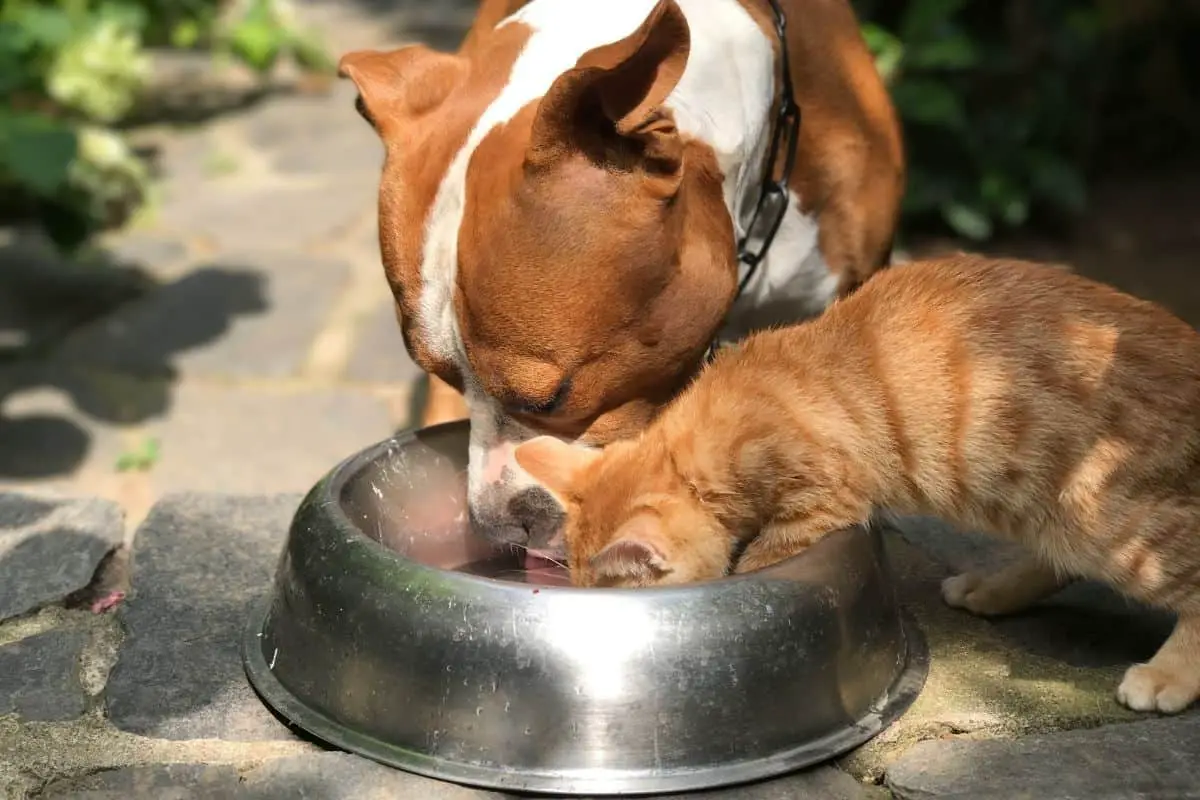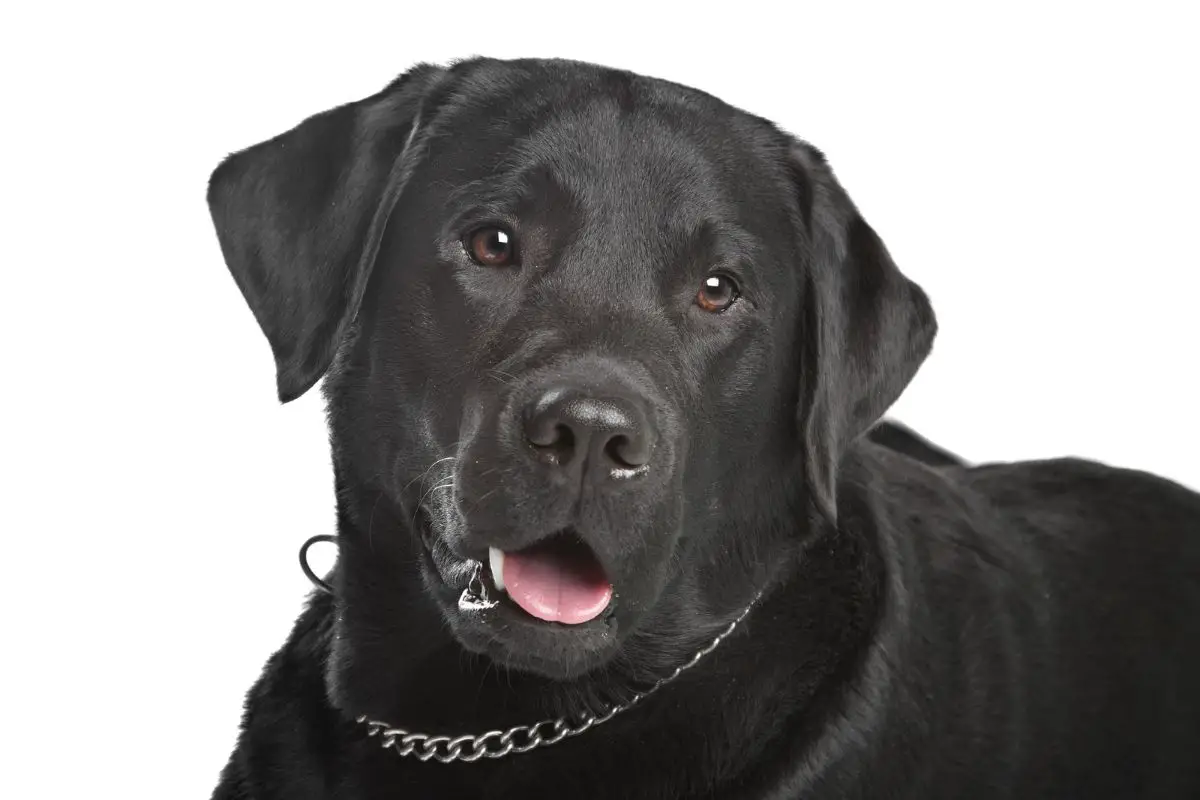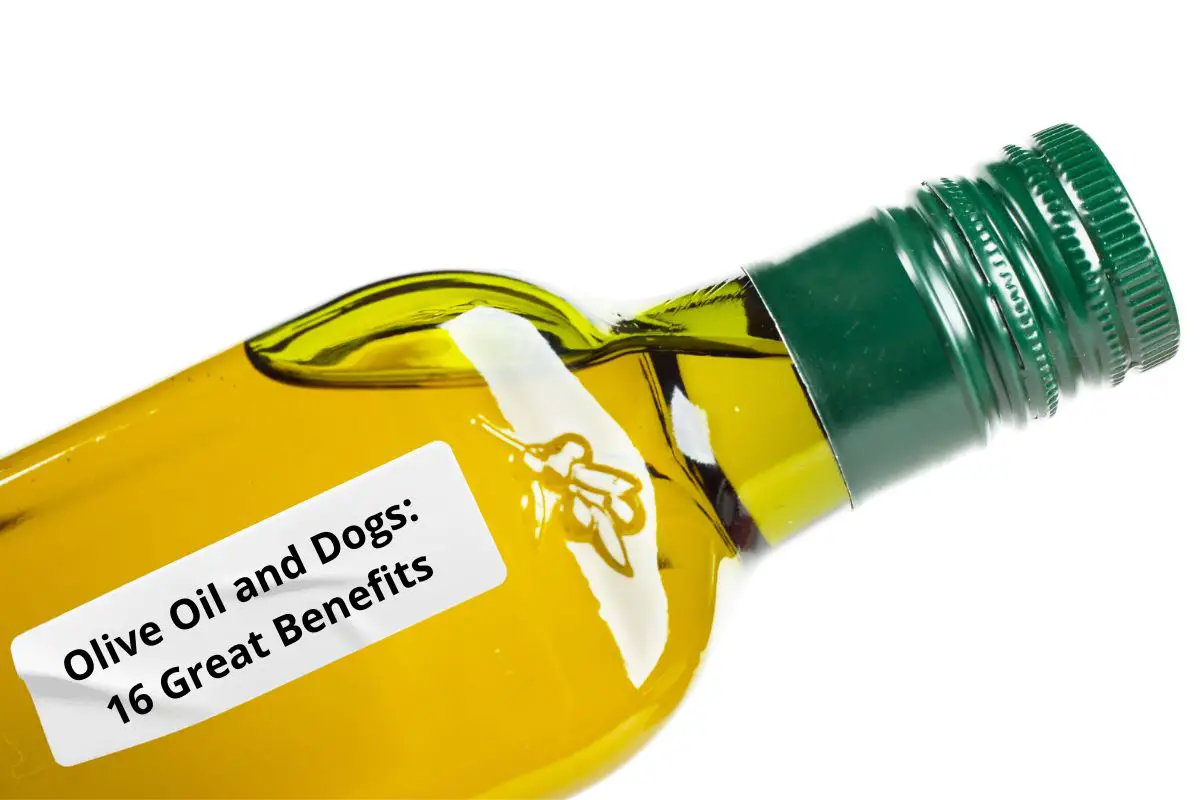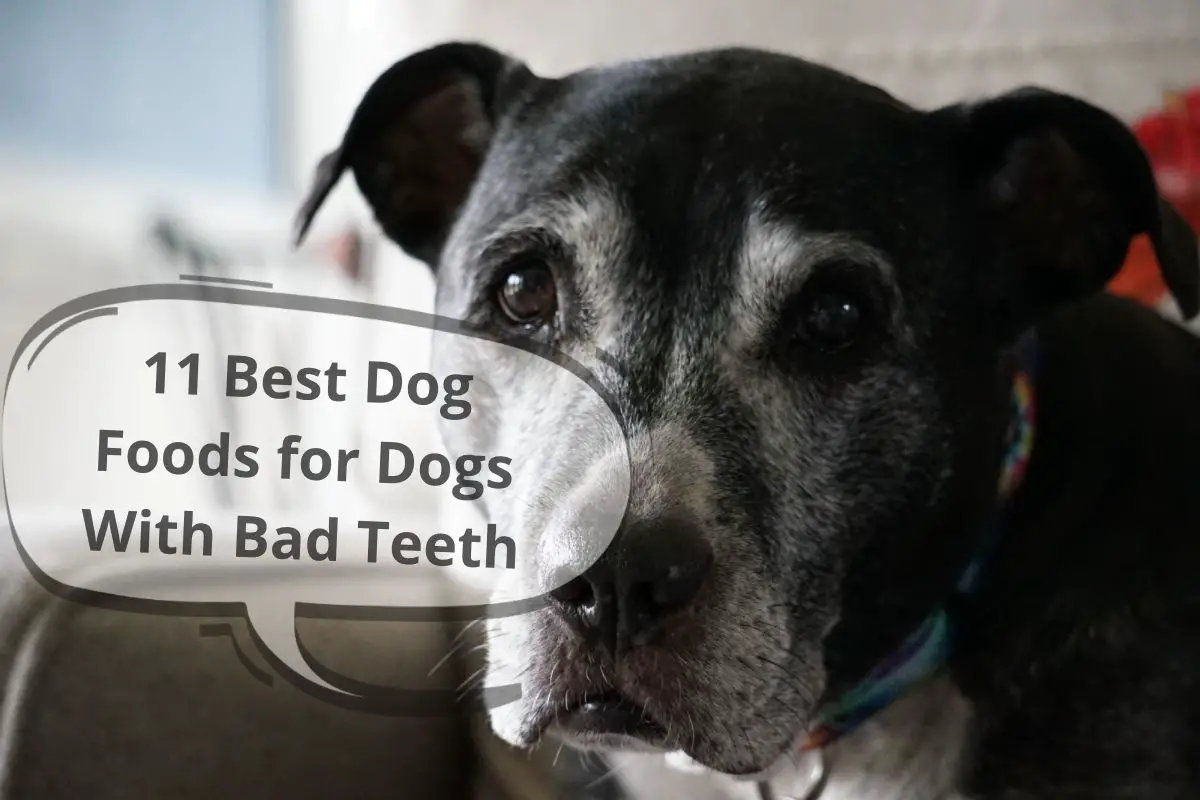This post contains affiliate links.
If you are an observant cat owner, you can agree that there are two types of cats: the picky ones who won’t eat anything else apart from their delectable cat food and the nosy ones who munch on any food material they come across. The latter type eats anything from what’s on your plate to what’s in a dog’s feeding bowl, even if it’s canned dog food. But will canned dog food hurt your cat?
Canned dog food will not hurt your cat if they eat it occasionally. However, long-term feeding on food specially formulated for dogs can hurt them. To be on the safe side, ensure you feed your cat canned food that’s specifically formulated for cats.
Unfortunately, a good number of people have a notion that every pet knows what’s best for them. However, this isn’t true, and it’s upon you to see that your feline friend feeds only on what’s meant for them. Read on to learn what experts say on the issue of cats feeding on canned dog food.
What’s the Difference Between Canned Dog Food and Canned Cat Food?
As much as some people argue that they are all pet foods, there is a reason why one is marked dog food while the other one is labeled cat food.
According to a pet expert Dr. Leslie, the main difference between canine and feline food is the nutritional composition. Cats have higher nutritional needs than dogs, and as a result, their food is often packed with tons of proteins, vitamins, minerals, amino acids, and fats. Additionally, feline food has a high-calorie content.
Generally, the ingredients used to prepare both foods are similar, only that their balancing quantities vary. While dogs are omnivorous, cats are obligate carnivores, meaning they need a higher content of animal-based nutrients to survive and maintain their general health.
If you’re keen enough on reading the ingredients label, you’ll easily note the nutritional difference between canine and feline food. Therefore, canned pup food won’t adequately meet all your kitty’s nutritional needs.
Outlined below is a brief look at the nutritional discrepancy between canned dog and cat food.
- Protein level: Although some dog foods are high in proteins, the Association of American Feed Control Officials (AAFCO) sets the minimum requirement at 18 percent. While this may seem high, felines’ protein need is about 26 percent. The 8 percent nutritional disparity is what makes the big difference between canine and feline food. Therefore, dog food won’t adequately meet all the feline’s protein needs.
- Taurine: Taurine is an amino acid vital in maintaining your pet’s heart, bile, retina, and some aspects of their reproductive health. Canines have sufficient amino acids in their bodies to synthesize taurine, while felines obtain it from the food they eat. Therefore, dog food lacks taurine, which is essential in a cat’s health.
- Vitamin A: Pups can easily turn beta carotene into vitamin A, but cats can’t. As a result, your kitty’s food must be supplemented with generous amounts of vitamin A to maintain their general health.
- Arachidonic acid: Cats also need Arachidonic acid for their reproductive health and efficient platelet aggression. Pups can create this fatty acid, but cats derive it from what they eat.
- Amino and fatty acids: Canines can manufacture both amino and fatty acids in the right amount, but felines can’t. Therefore, cats need food with a higher content of these essential acids that are absent in dog food.
- Carbohydrates: Felines and canines have different lifestyles. Pups walk a lot and are sometimes engaged in strenuous activities, requiring high amounts of energy. Therefore, their food is packed with a higher content of carbohydrates. On the other hand, cats are not as active as dogs and thus don’t need high amounts of carbohydrates in their food.
What Happens if a Cat Eats Dog Food?
If you’re raising canines and felines together, you’ll likely find a cat in a dog’s bowl and vice versa. A bite or two of dogs’ food don’t necessitate an emergency rush to the vet, but the fact remains cats shouldn’t eat canine food on a full-time basis.
If your cat continually feeds on food meant for dogs, the nutritional variation will cause negative effects on your cat’s health, which include:
- Blindness, heart problems, and deafness due to taurine deficiency
- Kidney, coat, and skin problems due to the absence of essential proteins and fats
- Poor reproductive health as a result of inefficient Arachidonic acid and taurine
- Anemia due to inadequate essential amino acids in the cat’s body
If you notice any of these conditions in your puss, it might be an indication it’s hurting from the continued usage of canine food. In this case, you should take your kitty for a medical checkup and take the necessary precautionary measures to counter the situation from getting any worse.
Can Felines Eat Canine Food in Case of an Emergency?
Having discussed the negative impacts of dog food on your cat’s health, you might now be worried whether it’s right to give your kitty some dog food in case of an emergency.
Regardless of how responsible you are, it’s common to run out of cat food. Maybe it’s in the middle of the night, you are out there camping, or there is a freak snowstorm, and you can’t access the pet stores, so what should you do?
The first thought that comes to your mind is using dog food as a substitute. Well, although it’s not advisable to do this full time, it might be the only option to save your favorite puss from the jaws of hunger. The good news is, yes, you can feed your cat using dog food in case of an emergency. However, be cautious not to make it a routine; if you do, you’ll be hurting your cat.
Why Cats Eat Dog Food
It wouldn’t be fair if we addressed felines eating pooch food without looking at the top reasons behind them doing it. Here are some of the reasons:
- Instincts: Like humans, animals, too, have instincts. Guided by its instincts, a kitty may feel that a dog eats something more luscious than him. As a result, it may be triggered to nibble some dog food.
- Owners’ fault: In most places, dog food is cheaper than cat food. As a result, some cat owners may often use it as a substitute for the pricey feline food, which gives their kitties a taste of something different from what they’re used to. By doing this, the cat develops a habit of eating canine food.
- Curiosity: Some felines are naturally nosy and maybe on the move to try something new.
- Revenge: Since dogs take some bites on cat foods, it can be a revenge mission.
- Inviting dog food aroma: Some dog foods have an irresistibly inviting aroma, and cats can’t help but eat them.
- Dog food ingredients: Some canine food ingredients such as Propylene Glycol (PG) are appetizing for cats. Your feline won’t resist dog food if it contains such an ingredient.
How to Keep Cats Away From Canine Food
Having learned the negative impacts of pup food on your feline, you might be intrigued to learn how to avoid this. Here are some helpful tips to keep your puss away from pooch food:
- If you have a multi-pet household where you’re raising your felines and canines together, you can keep the cats away from dog food by feeding them separately. If possible, you can feed them from separate rooms.
- In case there are any leftovers from your canine bowl, empty them immediately after eating. This is to eliminate chances of your cat having dog food to nibble.
- If your pup is tall, place its feeding bowl in a higher area, such as a countertop where the puss can’t reach.
- Tightly seal the cans containing dog food to keep your cat away from them.
- If possible, ensure you have enough stock for your kitty’s food to avoid ‘cheat days’ where you use dog food as a substitute.
- Always ensure your cat’s bowl has some food to eliminate its chances of trying out any other available food when hungry.
- If everything else fails, learn to monitor your pets during mealtime to ensure they both eat from their specific bowls. Here, you can give them treats or rewards after feeding on their bowls.
- If you are the carefree type of pet owner, you might end up hurting your favorite puss without even knowing it. Ensure your feline friend feeds only on feline food.
Conclusion
One way to ensure your feline friend remains in your life longer is to feed it on a healthy diet meant for felines.
While canned pup food is non-toxic to cats, occasional feeding won’t hurt your puss. However, making it a habit will hurt your cat since canine food lacks essential nutrients vital for feline health, such as proteins, taurine, amino acids, and fatty acids. It’ll likely cause negative health impacts, which include:
- Blindness and deafness
- Heart and kidney problems
- Poor reproductive health
- Skin and coat conditions
- Anemia
Related Articles
- Can a Cat Eat Dog Food? Is It Safe?
- Can Rats Eat Dog Food? What You Need to Know
- Can Deer Eat Dog Food? What You Need To Know
Sources
- The Nose print: Meet Dr. Jill & Dr. Leslie: All Your Pet Questions Answered
- Meow Mix: Difference Between Dog and Cat Food
- Britannica: Obligate carnivore | biology
- Association of American Feed Control Officials (AAFCO): Home Page
- Blog Spot: Cat Food: Difference Between Canned Cat Food and Dog Food
- Catster: Can Cats Eat Dog Food? What to Know About Cats and Dog Food
- German Town Vet Clinic and Pet Resort: Is It Bad for Cats to Eat Dog Food? | Why Cats Should Not Eat Dog Food
- The Nest: Is it Dangerous for Cats to Eat Dog Food?
- Yahoo: Could I hurt my cats by feeding them dog food?
- CatsPurfection: Can Cats Eat Dog Food? Is it Dangerous for Cats?
Mrdogfood.com is a participant in the Amazon Services LLC Associates Program, an affiliate advertising program designed to provide a means for sites to earn advertising fees by advertising and linking to Amazon.com. We also participate in other affiliate programs which compensate us for referring traffic.




